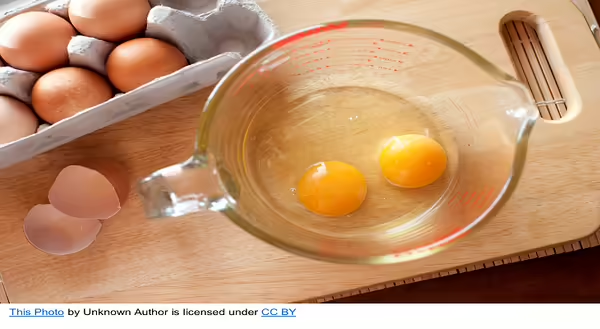
Eggs! The wonderful protein –cheap, easy to prepare and versatile! You can poach, boil, coddle, bake or fry them. Fold them into an omelet or bake them in a casserole. Breakfast, lunch, dinner or snack, eggs are a perfect addition to any meal.
Did you know?
- Eggs are an important source of protein, vitamins, antioxidants, carotenoids, lutein, zeaxanthin and essential amino acids. All for only 70 calories.
- Fertile eggs are no more nutritious than non-fertile eggs.
- Eggs are very economical! About 15 cents each!
- To store, keep eggs in carton and place on the bottom shelf of the refrigerator (can be kept 4-5 weeks after the date on the carton).
- To crack: tap egg firmly on flat surface (kitchen counter). Hitting egg on the edge of a bowl will drive bits of shell into the egg.
- Cracked/shelled eggs can be frozen, in an airtight container, for up to 1 year.
- Egg substitute or egg product can be purchased chilled or frozen. These are pasteurized, flavored, egg whites with added color. They do not contain cholesterol.
- The color of the shell means nothing---it is actually associated with breed of chicken—all eggs are nutritionally identical.
- Food safety concerns: assume all eggs are infected with Salmonella
- Cook all eggs to 160 degrees
- Wash all countertops, utensils with hot soapy water
- Never use the same utensils for raw eggs and ready to eat foods without washing in between tasks.
- NEVER allow anyone to eat products containing raw eggs, e.g. cookie dough, uncooked eggnog, protein drinks made with raw eggs, etc.
- Cook eggs on low to medium heat for best results.
- Do not add salt to eggs prior to cooking as it may cause watery eggs.
This time of year many families like to dye or color eggs. Be sure to follow food safety guidelines when using boiled eggs. Colored eggs must be refrigerated promptly after the color dries. If using real eggs for an Easter egg hunt make sure the eggs are not out of the refrigerator for more than 2 hours. Or simply discard the eggs when the hunt is complete.
Here are some recommendations for dyeing eggs naturally from the American Egg Board:
Making your own natural colors
Simmer uncooked eggs in water for up to 20 minutes with 1 tablespoon of white vinegar per cup of water and one of the following materials.
|
Material |
Color |
|
Fresh beets or cranberries, frozen raspberries |
Pinkish red |
|
Yellow onion skins |
Orange |
|
Ground turmeric |
Yellow |
|
Spinach leaves |
Pale green |
|
Yellow Delicious apple peels |
Green-gold |
|
blueberries or red cabbage leaves |
Blue |
|
Strong brewed coffee |
Beige to brown |
Ever wonder why your boiled eggs have that green ring around the yolk? This is caused by the Sulphur in the egg white reacting with the iron in the yolk. This chemical reaction is exaggerated when eggs are cooked too long or at too high a temperature or cooled too slowly. Avoid the green ring by following these directions:
Watch this video to learn how to make the perfect boiled egg
Place eggs in a single layer in a saucepan and cover with 1 inch of cold water. Cover, bring to a boil and immediately remove from heat. Let stand 11-13 minutes. Remove eggs from water. Chill by immersing eggs in ice water before peeling.
Source: https://www.incredibleegg.org/